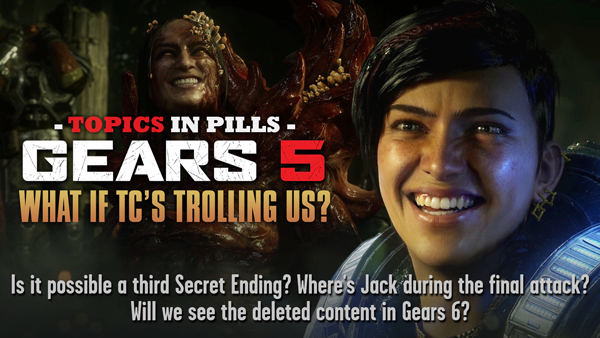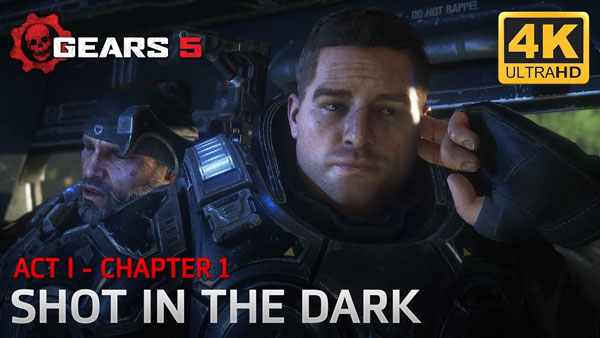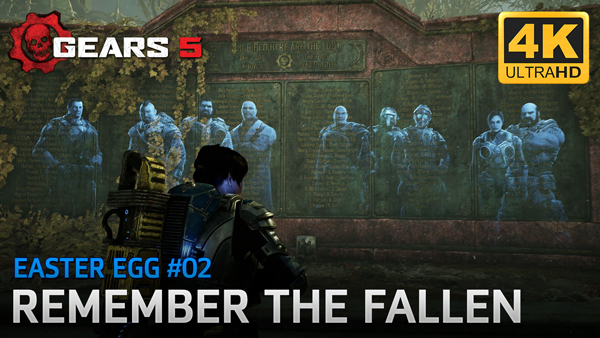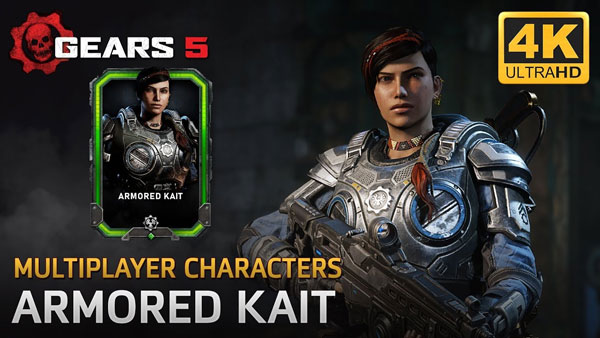
Vi diamo il benvenuto nel primo sito multilingua completamente dedicato al mondo di Gears of War. Qui potrete trovare riassunti, guide, soluzioni, informazioni e curiosità riguardo ai quattro capitoli della saga di Epic Games e tanto altro materiale legato ai romanzi e alla serie a fumetti. Nel caso voleste fornirci consigli, richieste o semplicemente commentare una news, potete farlo attraverso il nostro Forum.

We had the opportunity to interview Karen Traviss, a British science fiction author and full-time novelist. Traviss is well know to the Gears of War fans for having developed the story of GOW, with the realization of the novel and the comic books, and also like a screenwriter for Gears of War3.
- What do you think about Gears of War? Your contribution was fundamental for the creation of such an intense and thrilling plot, so rich in details. Was it difficult to reconstruct the passages of the drafted plot in the first two chapters of the game? Did the people at Epic help you with suggestions and directives or did you do the work autonomously?
- I specialize in writing games-based fiction, and I've got a a formula for doing this. I'm used to absorbing the information that I need from the cinematics, with additional information from the story bible, and from the script if it's available. I need to see the raw data, which means I don't want to read what anyone else has written based on a game — I need to see the basic building blocks of the game itself so I can work it out for myself.
From that I can extract the elements I need to preserve to maintain the atmosphere of the game as well as the continuity. That's really all I need. In terms of the Gears novels and comics, I was given complete freedom to come up with plots and story arcs — one of the reasons Epic hired me was to develop the story. Very sensibly, Epic don't fill in more detail in the game than they absolutely have to. For the first novel, for example, the battle of Aspho Fields was only mentioned as a one-liner in the first game, and apart from the fact that Carlos Santiago was killed during the battle, no other details had been filled in. They left that to me. I knew the rough shape of the whole story arc from the beginning of the franchise to the end of the third game, so it was an exercise in logic to fill in the gaps based on what the characters would do naturally. Characters behaving consistently is the absolute backbone of all my fiction.
Every franchise works differently, but with Epic Games I've been involved not only as a writer but also as a story consultant, and that means that I was part of the core creative team. We work alongside one another on a daily basis. I write the comics as well as the novels now and I was lead writer on Gears of War 3, so I've got as good an understanding of the storyline as anybody.
- Where did you get the idea of creating this character? The charisma that shines through and the depth of her personality gives the impression that this character is special for you. Is it like this or are there other characters you like more?
- To make Aspho Fields work I needed a veteran Gear - preferably a sergeant - who remembered the events of the battle (which Dom didn’t know about, of course) and who had also been away from the Delta Squad characters for years so that the gaps were filled in naturally by the character recounting the story. The franchise was very short of female characters with any "weight" to them at the time, so I solved the problem by making the veteran sergeant a woman for a change.
There's always a tendency to say to women writers that if there's a female character, then it has to be somehow special for that writer. Well, that's just not true, (And nobody says that about male characters to a male writer, do they?) I don't know how much of my other work you've read, but all the original characters I create — whether for franchises or for my creator owned fiction — are equally three dimensional and complex, and most of them are male. My speciality is creating believable characters, and although I can do a lot with characters that I inherit from franchises, the ones that I create from scratch work best. It's because I use psychological profiling techniques. I literally build the character from the ground up. They're not based on anybody, they're not derived from anything, and I put an enormous amount of work into them.
I have no favourite characters. Some of the ones that I've most enjoyed writing over the years are people who would be utterly repellent to me in real life. I get enjoyment out of the technical challenge rather than the end product. Fans like characters, but I just like writing. I enjoy characters that are difficult to write, because the fun in writing — for me, anyway — is the technical skill and effort that I have to use to get the effect I'm seeking. The more difficult it is, the more satisfaction I get. The audience never sees any of that and so they can't tell which characters have been the hardest to write.
But I have no interest in or attachment to any of the characters in any of my books or comics. If I couldn't stay detached from the characters, I wouldn't be able to write to them at all. My technique is what's known as very tight third person point of view, which means that I have to get into every character's head and think as they think, and see the world as they see it — not as I see it. That's what makes my writing vivid. But I can only do that because I can detach from the characters and move from one to another very easily. A writer who gets attached to their characters also has another problem - generally, they're not as willing to take that character to their logical conclusion and show all the elements of their personality, good and bad. They shy away from taking real risks with them.
This is why I have no difficulty whatsoever killing off characters in fiction. If that's where the story's heading, that's where I go.
- On your site, in the novel section, we have found information about a fifth book of the series. Are you willing to give us a little bit of information about it? Is it possible that the fifth novel is a long epilogue to the saga about Marcus Fenix, maybe even narrated from his point of view?
- I can't tell you anything about book five yet.
- In the last published novel, Anvil Gate, Sam Byrne appeared for the first time. Was this planned, or was it a request by Epic in order to add another female character, besides Anya and Bernie?
- Sam Byrne was planned as a character for the third game, and I was asked to create her character profile for the game. I asked if I could also use her in Anvil Gate so that fans were used to her before they played the game. It was also useful to establish Sam's speech patterns in the book before I got down to writing the script.
- Besides Jace Stratton, another character who was also extremely popular in the comics is Alex Brand, but nothing has been said about the presence of this character in the third chapter; will she be found in Coalition's End?
- You'll have to wait until the book comes out in a couple of months. There's a large cast of characters in the books out of necessity, because there's a lot of story that needs to be told to put the third game in context. Some people's favourite characters won't be in the book, some will. I don't put characters in books purely for the sake of having them there — they have to be an integral part of the story.
- Epic Games has revealed that the story of Marcus Fenix will end in Gears of War 3, but that this is not the last chapter. Some mysteries will remain and will be proposed and re-elaborated afterwards. Is there a possibility of your participation in the future saga?
- It's too early to say. I work for a number of franchises, including other games, and I have my own series as well. It depends on timing.
- Among the people mentioned in the acknowledgments in various novels, many are members of the army or navy and we also know that you were in the navy. Do you often draw inspiration from real life events, maybe even firsthand experiences?
- First, let me correct something — I wasn't in the Royal Navy, I was in the Royal Naval Auxiliary Service, which was a reserve service. I was also a newspaper defence correspondent, and I had close contact with the armed forces in other jobs over the years. So what you see in the books, comics — and even in the game to a certain extent — is authentic. But I don't base stories on things that happened to me, any more than I base characters on real people. When you write based on broad professional knowledge, though, there are always situations that are familiar to that particular community. I'm pretty sure, technology apart, that a Roman soldier would look at my books and recognize elements of life in uniform that he would be familiar with, because the underlying challenges for men and women on the front line haven't really changed over the centuries. I have a lot of military readers, and there's a great deal in my fiction that resonates with them differently from civilian readers.
- How long have you been a writer? Did you set out intentionally to write a novel or was it simply a personal challenge? Is this basically a job for you or is it also a great passion?
- I've been a writer of one kind or another all my working life, mostly as a news journalist, although I've done pretty well every nonfiction writing job there is, from advertising copywriting to political speeches. I started writing fiction relatively late in in my career when I was working in government public relations and wanted to get out. A career consultant I knew suggested writing fiction as a business, so I simply did my market research, drew up a business plan, set myself five-year targets like any other company, and stuck to the plan. There's no luck involved. You can plan a writing business just as you can plan a construction firm or a legal practice. The principles are basically the same.
I love writing fiction, and I find writing anything natural and easy. But it really is just a job, and if for any reason I couldn't do it I'd have no problem going back to journalism, or anything else for that matter. Fans find it hard to imagine anything better than writing for a universe they love, but it's strictly business for me. Just because I enjoy doing it doesn't mean that I'm emotionally tied to it. One thing that's hard to convey to audiences is that a passion for the craft isn't the same as a passion for the subject matter.
As a journalist, you learn to get the most out of the topic you're writing about and make it as interesting as it can possibly be, whether it's something you're interested in personally or not. Everything can be made interesting if it's thoroughly researched, treated objectively, and well-written. I'd rather write military material, whether it's factual or fiction, but there's nothing I couldn't turn my hand to if I had to.


GOW-Series.com is part of Games-Series.com Network | Contents by NeDan89, Scric93 and IggyZW. Design by NeDan89 and Daniel. | Top
Texts, images and videos are property of GOW-Series.com. All other registered trademarks or trademarks are property of their respective owners.
Best view 1280x720 - All major browsers and OS compatible - WAI Level 2 and CSS Valid


























